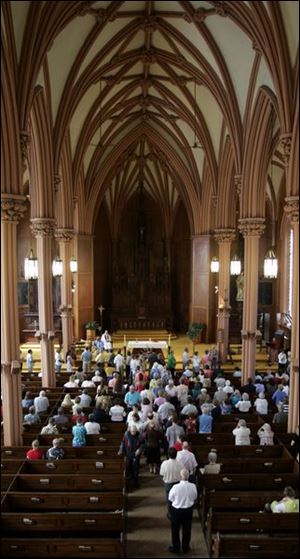
Changes coming in Catholic Mass
9/20/2008
The Vatican has approved a new translation of the Order of the Mass.
Change is coming for English-speaking Catholics - but the timing and full extent of the changes to the Mass have yet to be determined.
In July, the U.S. Conference of Catholic Bishops announced that the Vatican has approved a new English-language translation of the Order of Mass, or Ordo Missae.
While the changes are not expected to be implemented for several years, when they are they will involve new wording of familiar prayers and phrases that American Catholics have been reciting for decades.
The response to "The Lord be with you," for example, will change from "And also with you" to "And with your spirit."
The prayer said before Communion will be, "Lord, I am not worthy that you should enter under my roof," instead of "Lord, I am not worthy to receive you."
The revised Order of Mass has been in use in the United States and other English-speaking regions since 1969, when it was introduced after the Second Vatican Council.
In 2001, the Vatican issued instructions, Liturgiam Authenticam ("The Authentic Liturgy") calling for bishops' conferences around the globe to review their liturgical texts for conformity to the Latin original.
That has led to extensive study and discussions of the English translations by the Catholic Church's International Commission on English in the Liturgy, or ICEL. Bishop Leonard Blair of the Toledo Catholic Diocese is a member of the commission.
There are 11 national conferences in the ICEL, including Australia, Scotland, Ireland, Canada, and the Philippines, but the United States represents 85 percent of English-speaking Catholics worldwide.
U.S. bishops voted 173 to 29 to approve the proposed revisions to the Order of the Mass at their meeting in June, 2006, and the Vatican's Congregation for Divine Worship and the Discipline of the Sacraments gave its blessing this summer.
About the same time the Vatican issued its approval, American bishops voted to reject another proposed translation of the liturgy, this time for changeable parts of the Mass such as the opening prayer spoken by the priest.
One dissenter, Bishop Victor Galeone of St. Augustine, Fla., said in an article he wrote for the Sept. 8 issue of America magazine that the proposed changes were, generally speaking, "a rather stilted rendering of the Latin."
Bishop Galeone said the writers of the original Greek and Latin biblical texts used "everyday language spoken on the street."
The USCCB will revisit the issue at its November conference.
Most observers say any changes to the Mass won't be implemented piecemeal but will wait until all parts of the Roman Missal are approved by the bishops' conferences and the Vatican.
Although the revisions are not expected to be implemented until 2010 at the earliest, they definitely are on the way.
"It will be a big undertaking," said the Rev. Charles Singler, director of the office of worship for the Toledo diocese. "We'll have to do some training and help people come to understand why."
He said plans are being made on the national level to educate lay Catholics - as well as clergy and music directors - about the revisions.
"We're creatures of habit and we get used to things that have been that way for a long time," Father Singler said. "But it will breathe new life into the church. While we think it's problematic, there's an excitement about it."
The ICEL's task is not to produce a literal translation from the Latin, as if frozen in time, but to render the texts accurately and faithfully in English while using contemporary syntax and language.
Richard Gaillardetz, professor of Catholic studies at the University of Toledo, said the translators must walk a fine line.
"There's a balance to be struck," he said. "Part of the power of worship, particularly in a liturgical tradition, is that there's a familiarity to the language. There are turns of phrase that are evocative and that we've heard ever since we were children. You don't want to change it too much.
"On the other hand, language changes and you get sort of a tipping point where the younger generation does not understand the meaning of key phrases."
He, like Father Singler, said the church will make sure that the average Catholic is informed of the changes.
One of the criticisms of the 1969 revisions was that they were "dumped in people's laps without adequate preparation," Mr. Gaillardetz said, and church officials will be careful that doesn't happen with the next translation.
More information on the English translations is available online at usccb.org/liturgy and icelweb.org
- David Yonke